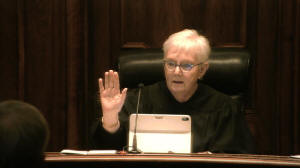|
The case heard by the Supreme Court in May focuses on two
individuals who were charged with reckless discharge of
firearms, had their FOID cards suspended, but later pleaded to
misdemeanors, which doesn’t rise to the level of a FOID card
being revoked.
In March 2023, Madison County Associate Judge Donald Foster said
the law allowing Illinois State Police to suspend FOID cards “is
hereby declared unconstitutional as applied to persons charged
with a felony but not yet convicted of a felony.”
Representing the firearms owners in front of the Illinois
Supreme Court, attorney Thomas Maag told the Supreme Court his
clients have standing.
“The statute has not been repealed,” Maag said. “If they were to
be charged similarly in the future, they would be subject to the
exact same prohibition.”
During oral arguments, Chief Justice Mary Jane Theis questioned
standing in the case as their FOID cards were reinstated before
the hearing.
“This lawsuit looks prospectively. It doesn’t look back,” Theis
said. “It doesn’t say, ‘I was injured therefore I have damages.’
It looks forward, what will happen in the future?”
Justice Mary K. O’Brien asked about whether the case is moot.
“Don’t you have to get past the hurdle of having an actual live
controversy to decide?” she asked, considering the litigants’
FOID cards were reinstated.
Maag reiterated the law is still in place.
“It is enforced routinely, thousands if not tens of thousands of
times a year,” Maag said.
Despite that argument, justices unanimously enjoined the
suspension of FOID cards for the litigants but vacated a lower
court’s ruling the law was unconstitutional.
“In entering this disposition, we express no opinion on the
merits of the parties’ other arguments. As we are vacating the
circuit court’s judgment in favor of plaintiffs, they are no
longer the prevailing parties, so we also vacate the circuit
court’s order granting plaintiffs’ petition to recover costs and
fees,” the ruling said. “The cause is remanded to the circuit
court with directions to dismiss plaintiffs’ first amended
complaint.” |
|




